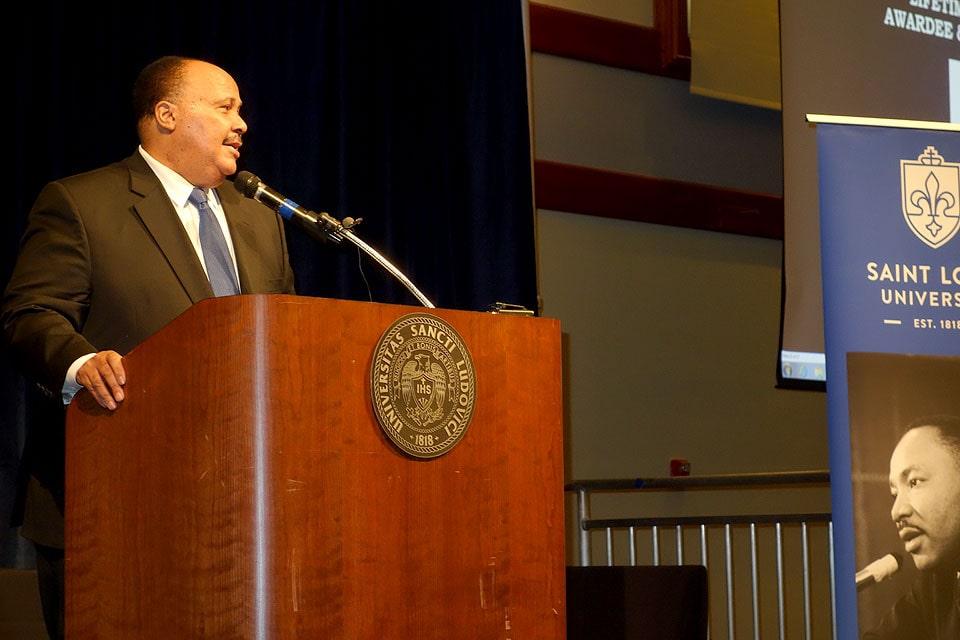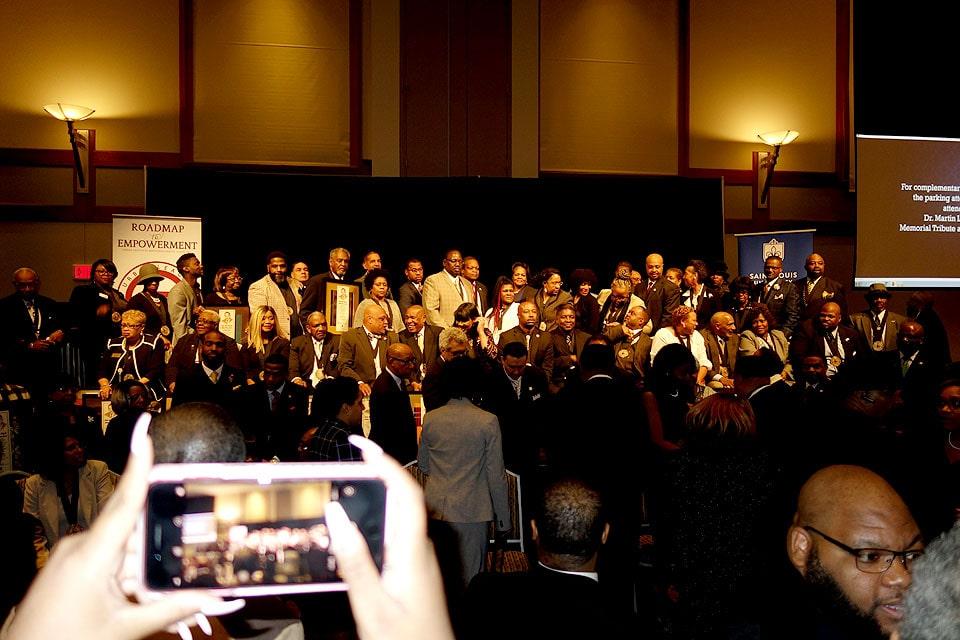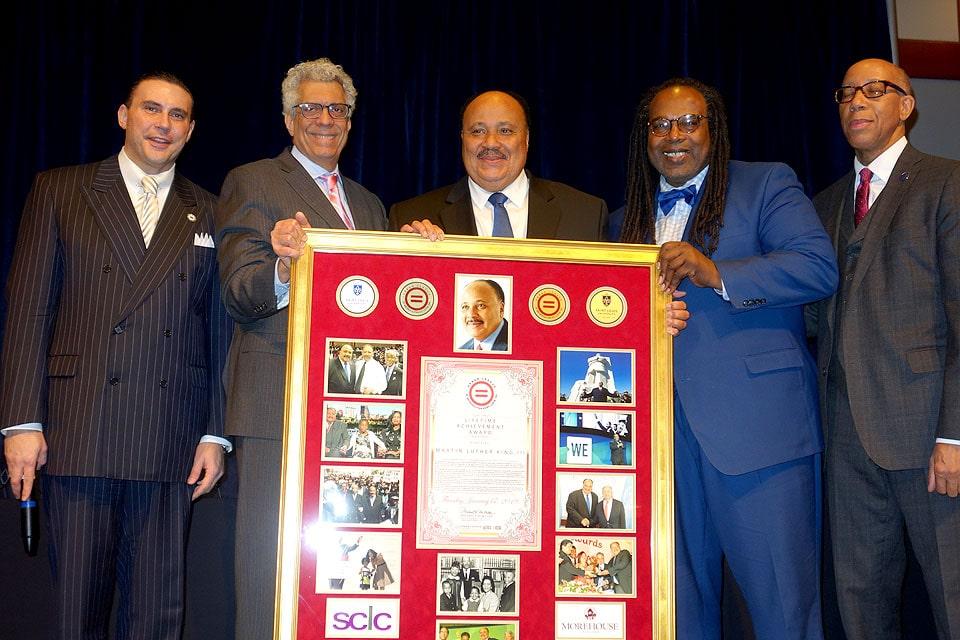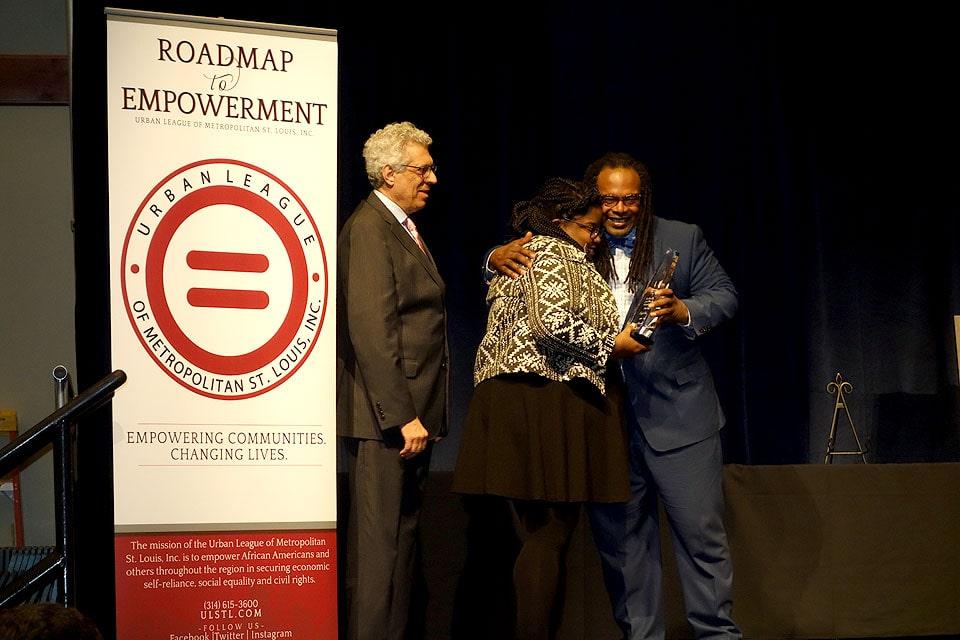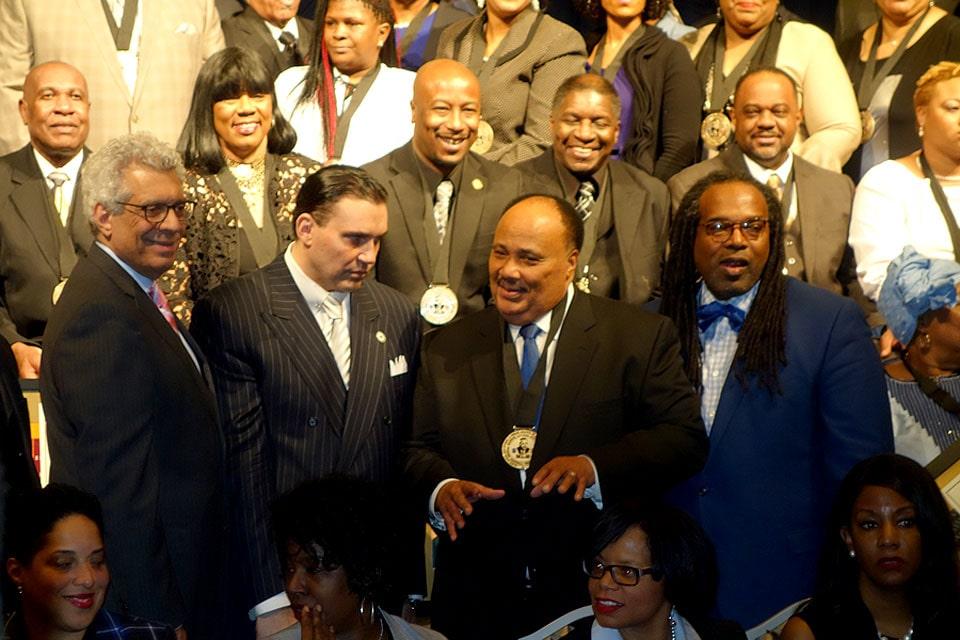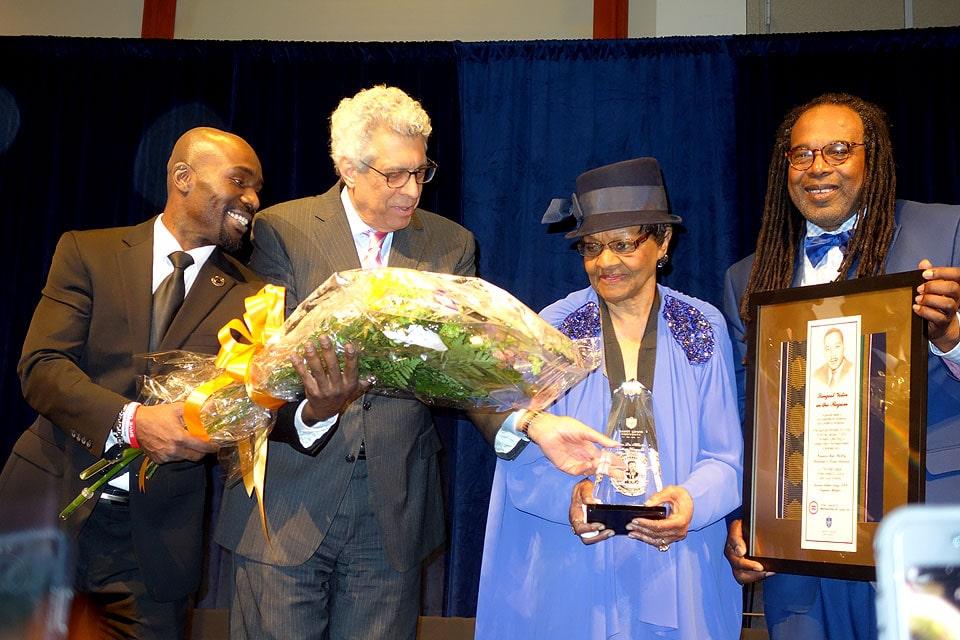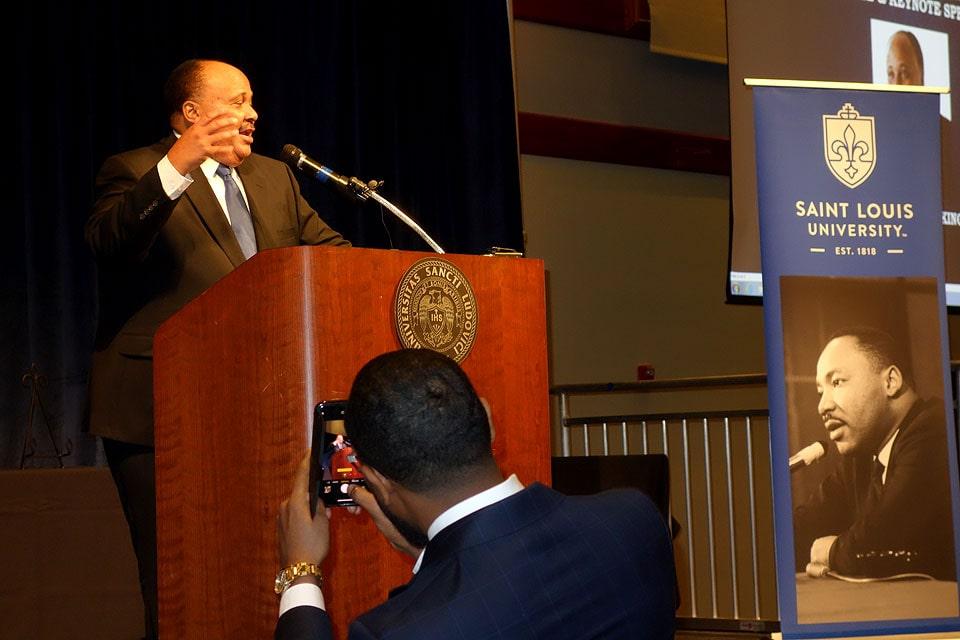SLU, Urban League Welcome Martin Luther King III to Honor Father's Legacy
The son of two of the 20th Century's most famed civil rights activists called for continued work toward racial equity and social justice at the 2019 MLK Memorial Tribute honoring the life and legacy of the Rev. Dr. Martin Luther King, Jr.
Recalling his feeling of awe listening to his father's "I Have a Dream Speech," as a five-year-old, Martin Luther King III told the crowd gathered in Saint Louis University's Wool Ballroom, "that vision that my father and mother championed never wavered."
"Discrimination is a tenacious evil," King III said. "We are a better nation than the behavior we exhibit. We've got to find a way to bring Americans together. We're too divided, too segregated, too isolated from each other. We've seen bursts of greatness but we have not yet been great. We become great because we have greatness in us."
King, the son of Civil Rights leaders the Rev. Dr. Martin Luther King, Jr. and Coretta Scott King, was the keynote speaker at the 2019 Rev. Dr. Martin Luther King Jr. Memorial Tribute at Saint Louis University’s Busch Student Center on Thursday, Jan. 17. The annual event honors the elder King’s legacy of humanitarianism, social justice work and his campaign for racial equity.
The memorial is co-hosted by SLU and the Urban League of Metropolitan St. Louis. In the tribute event’s seven-year history, it has played host to noted civil rights figures including Ambassador Andrew Young last year. Martin Luther King Jr. spoke at SLU in 1964, delivering a speech that focused on racial justice.
Soloist Nakischa Joseph performed “Lead Me Lord” as the event got underway. Following a welcome by University President Fred P. Pestello, Ph.D., and prayers by Christopher Collins, S.J., assistant to the president for mission and identity, SLU alumnus Michael McMillan, president and CEO of the Urban League, welcomed those gathered.
Speaking as His Parents' Son
King III called the crowd’s attention to pressing issues including family separations at the U.S./Mexico border, continued discrimination on the basis of race, gender and sexual orientation, voter suppression and economic insecurity. He recalled his parents’ belief in their fellow women and men to bring out change and urged those gathered to take up the Civil Rights Movement’s call to action.
Each person, King III said, building off a quote by educator Horace Mann, can contribute to humanity’s progress and well-being, even in the face of social division and political discord.
“I see greatness in America in tsunamis, in hurricanes,” King III said, “when we give donations, and some of us go out to serve on the ground. And they don’t ask, ‘What color is your skin?’ or ‘What is your sexual orientation?’”
He noted that his father would be 90 this year, and that, because the elder King was killed before his 40th birthday, much of his work had been left undone.
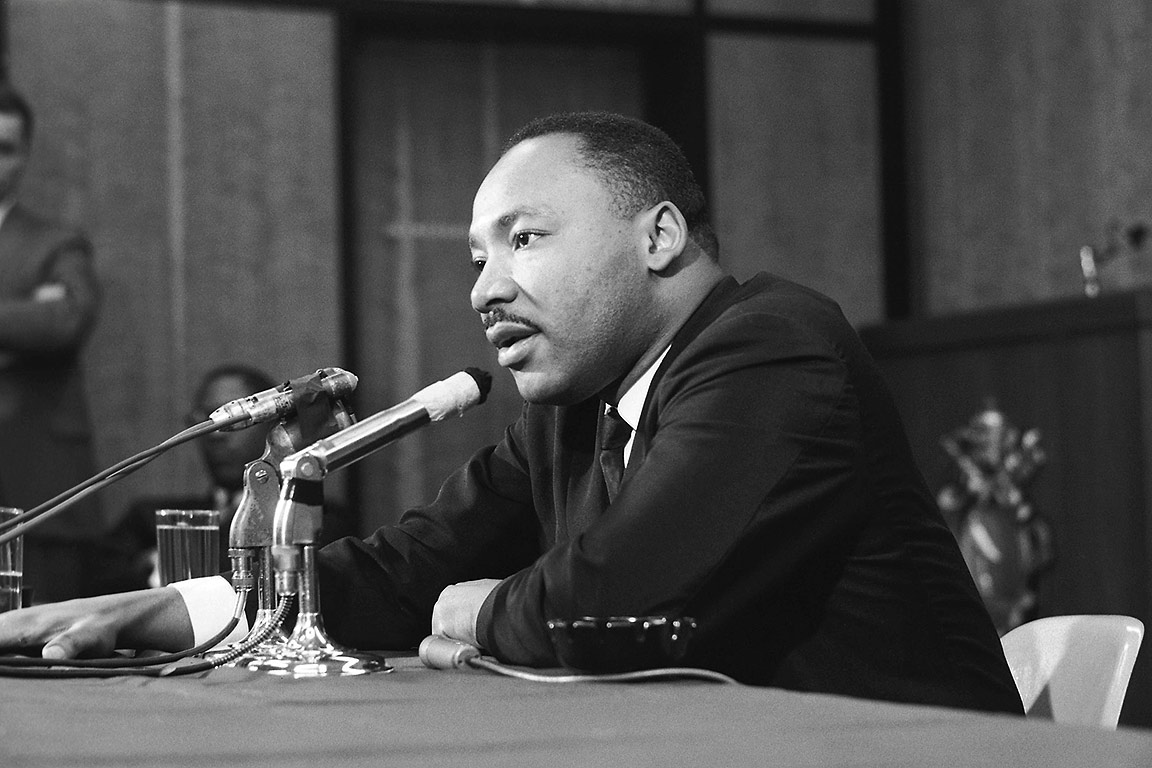
“It’s hard to imagine what he would have been like at 90,” King III said of his father, “but his legacy is still alive today through a dazzling array of programs.”
The time for celebrating his father's legacy, he continued, is coming. But now is the time for work toward justice, King told the crowd, not a celebration of a job well-done.
“What we have is a birthday observance,” he said, “but not yet a celebration. I often think about when we will have the ultimate celebration in this nation that we all call home.”
“Because we can’t really celebrate when we pay women less for a job than a man. We really can’t celebrate when we have racial injustice – not all days, but some days. We can’t celebrate when we have children – black, brown, white, poor – who are failing out of schools in this nation of ours. We can’t celebrate when we are divided,” King III told the crowd. “We can’t celebrate when we’re splitting up families at the border. We must embrace that we are all brothers and sisters in the great human family.”
Honoring Those Making a Mark for Humanity
The event also honored Frances Mae Shelby, a political and civic activist who has never missed voting in an election in 75 years; community organizer and activist Kayla Reed; Mona Hicks, Ed.D., SLU’s associate vice president and dean of students; and elected officials from St. Louis County and City, including the city’s full Board of Alderman.
In all, more than 180 regional leaders were honored and they would gather for a large group photo at the end of the memorial celebration.
We've seen bursts of greatness but we have not yet been great. We become great because we have greatness in us."
Martin Luther King III
McMillan laid out the accomplishments of the day’s awardees. McMillan praised SLU’s Mona Hicks, Ed.D., dean of students, for her devotion to SLU students. He noted Reed’s impact on St. Louis communities, and 93 year-old Shelby’s passion for getting out the vote. All three women were among the day’s honorees.
Shelby praised God and received standing applause as she received her award from University President Fred P. Pestello, Ph.D., and SLU's Vice President for Diversity and Community Engagement Jonathan Smith.
The Urban League also honored the University with a special award for its work in the spirit of Dr. King’s call to action.
Award Winners
- Longest Voter in the St. Louis Region: Frances Mae Shelby, political and civic activist who has never missed voting in an election in 75 years
- Saint Louis University Community Service Award: Kayla Reed, community activist and civic organizer
- Donald Brennan Humanitarian Award: Dr. Mona Hicks, associate vice president and dean of students at Saint Louis University
- African American Political Leadership Award: St. Louis City Board of Aldermen and St. Louis City and Country Elected Officials
Founded in 1818, Saint Louis University is one of the nation’s oldest and most prestigious Catholic institutions. Rooted in Jesuit values and its pioneering history as the first university west of the Mississippi River, SLU offers nearly 13,000 students a rigorous, transformative education of the whole person. At the core of the University’s diverse community of scholars is SLU’s service-focused mission, which challenges and prepares students to make the world a better, more just place.


















